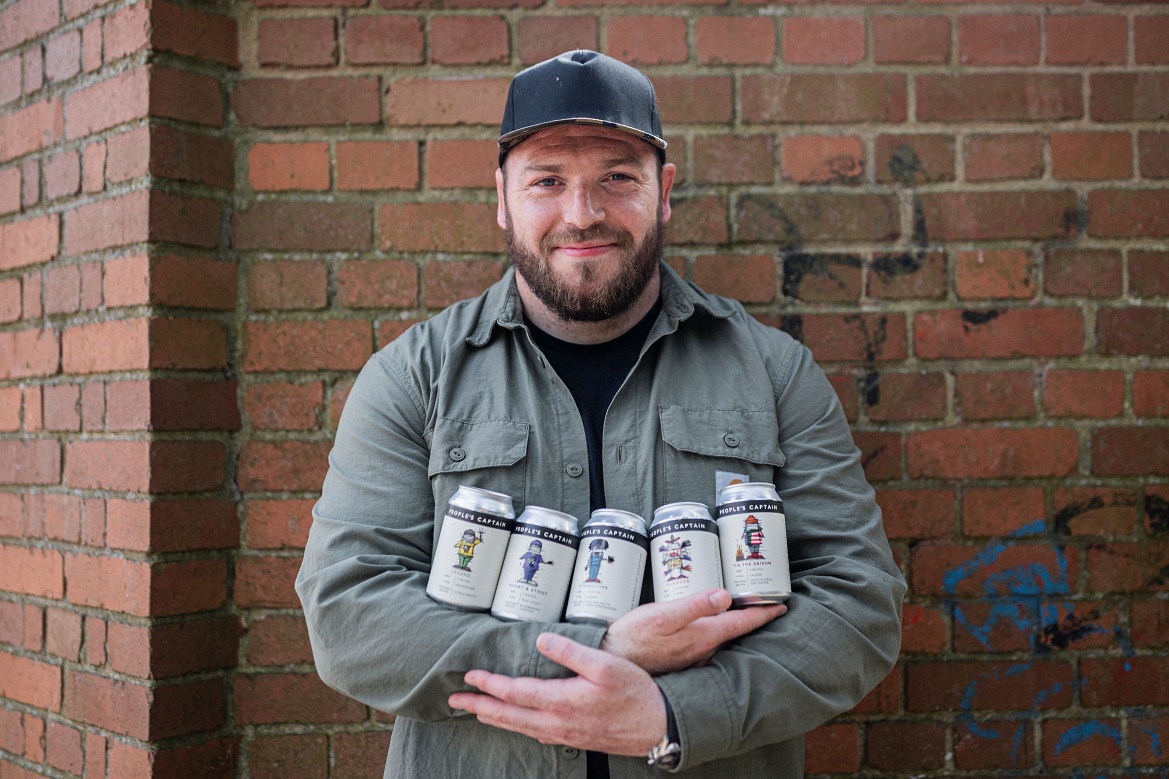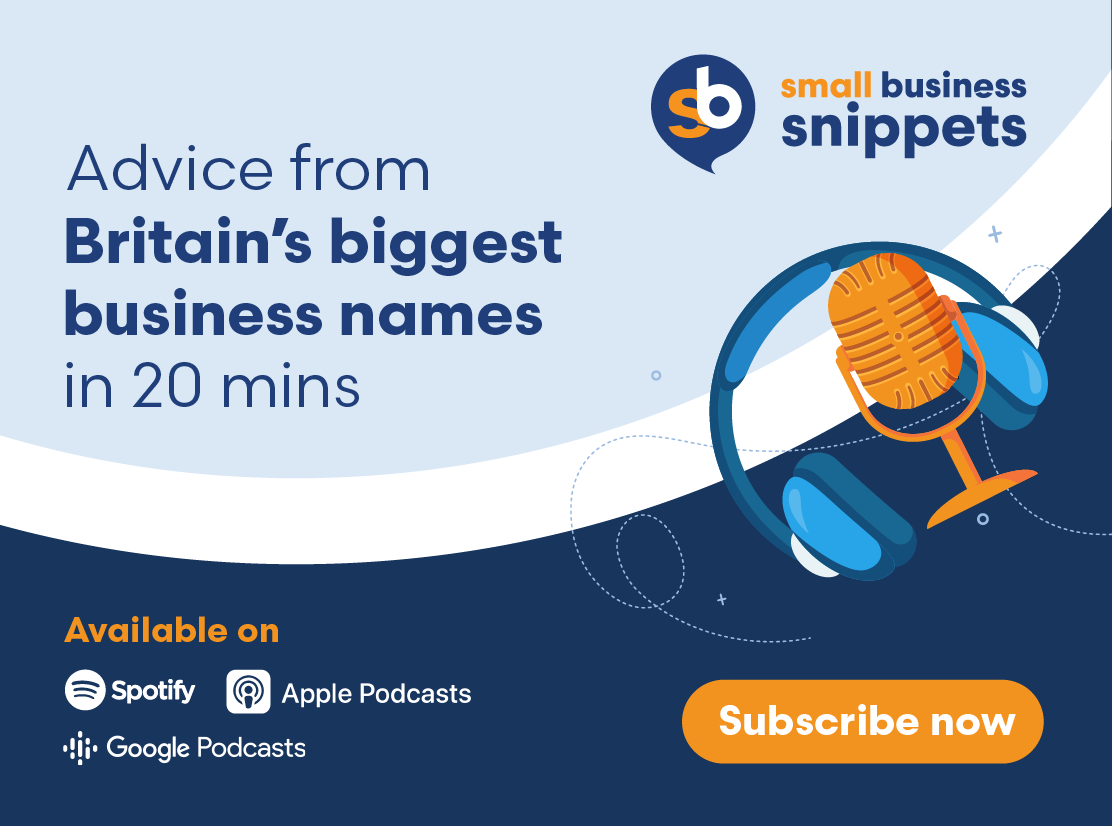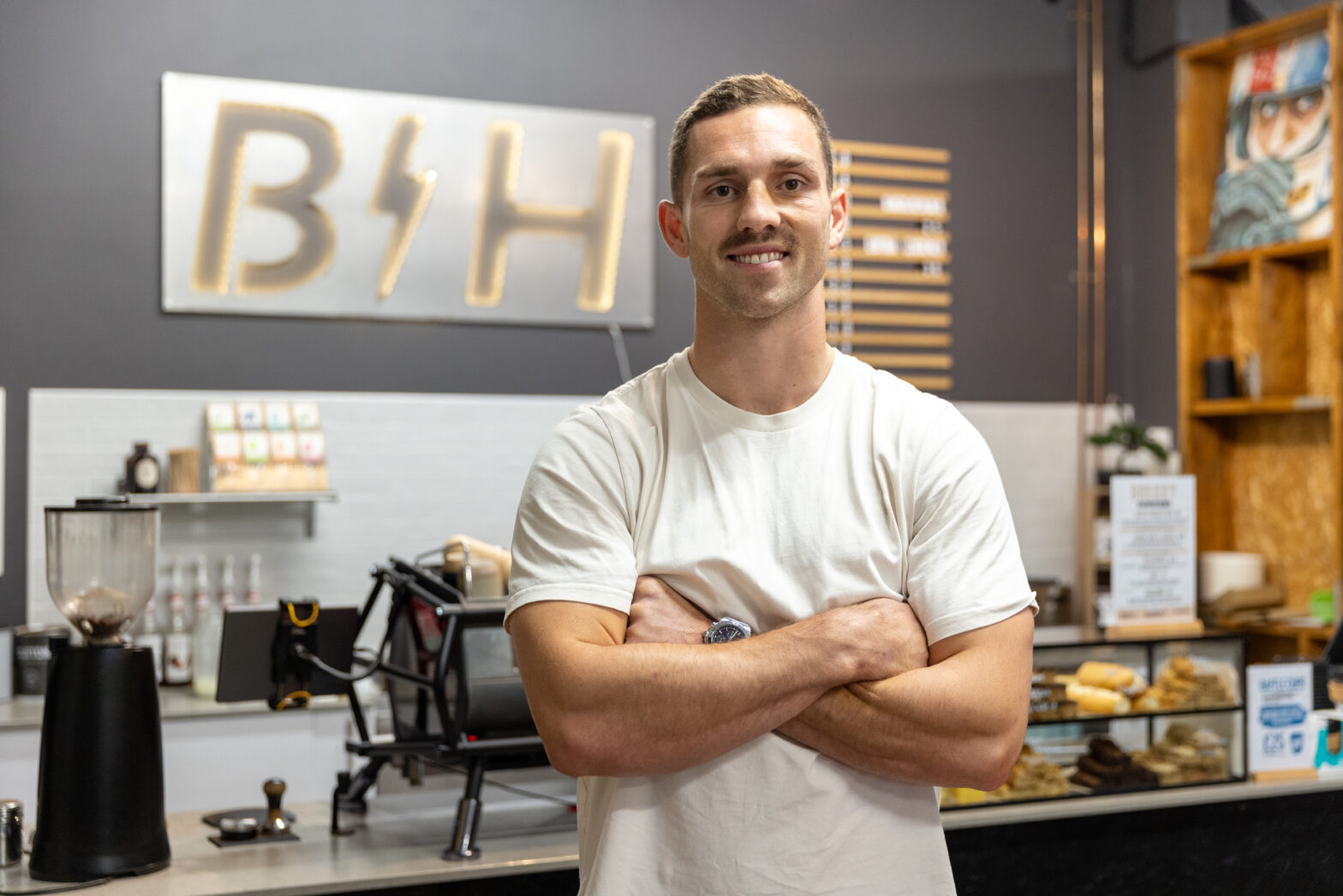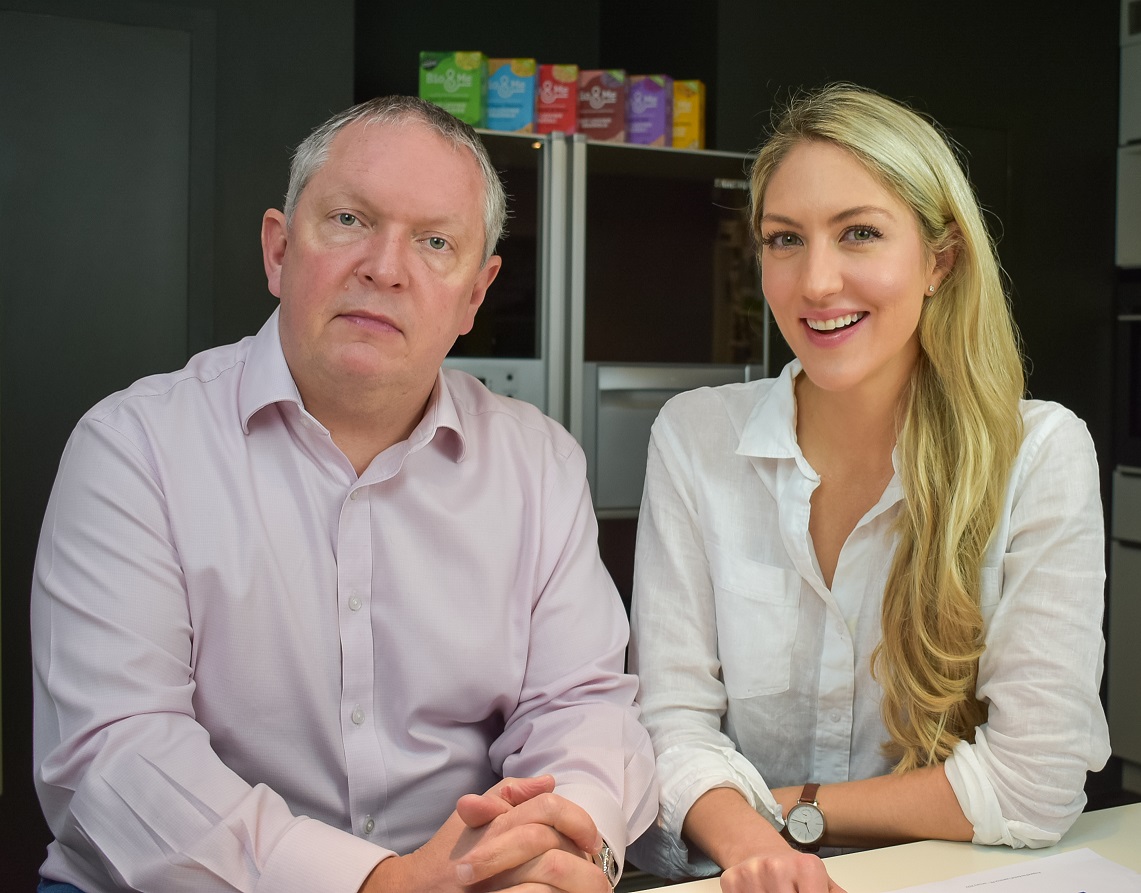Welcome to Small Business Snippets, the podcast from SmallBusiness.co.uk. Today’s guest is Greg Bateman, former Rugby Union player and founder of craft beer brand, People’s Captain.
We’ll be discussing how to collaborate with other brands and how to have a successful trade show.
Listen to it in the media player below.
Or check out the teaser videos below:
You can also catch our episodes with:
- Scientist and The Gut Health Doctor, Megan Rossi, and commercial marketing expert, Jon Walsh – founders of Bio&Me
- Entrepreneur, author, investor and podcaster, Grace Beverley
- Entrepreneur and star of SAS: Who Dares Wins, Ollie Ollerton
- Business owner and former pro footballer, Thomas Hal Robson-Kanu
- Myleene Klass and Jamie Barber, founders of My Supper Hero
- Pub owner and winner of The Great British Bake Off, Candice Brown
- Entrepreneur and former athlete, Sally Gunnell
- Entrepreneur and The Apprentice winner, Sian Gabbidon
- Abel & Cole founder and chairman of Freddie’s Flowers, Keith Abel
- Entrepreneur and The Apprentice 2019 winner, Carina Lepore
- Dragon Tej Lalvani and entrepreneur Sam Jones
- Angel investor, entrepreneur and TV personality, Spencer Matthews
- Entrepreneur and former Dragon on Dragon’s Den Ireland, Lady Chanelle McCoy
- Businessman and The Apprentice winner, Mark Wright
- Entrepreneur and campaigner, Paul Lindley
- Managing director of Brompton Bikes, Will Butler-Adams
- Businessman and author, Gerald Ratner
- Entrepreneur and TV presenter, Trinny Woodall
- Pub owner and bartender on Channel 4’s First Dates, Merlin Griffiths
- Founder and chairman of Pimlico (formerly Pimlico Plumbers), Charlie Mullins
- Retail expert and former Dragon, Theo Paphitis
- Author and boardroom expert, John Tusa
- Digital guru and investor, Sherry Coutu
- Entrepreneur and former Dragon, Rachel Elnaugh
- Businesswoman and Dragon, Deborah Meaden
- Entrepreneur and The Apprentice 2005 candidate, Tim Campbell
- Gousto CEO, Timo Boldt
- Entrepreneur and The Apprentice 2018 candidate, Jackie Fast
- Investor and former Dragon, Piers Linney
- Investment fund manager, Nicola Horlick
- Supermodel turned entrepreneur, Caprice
We’ve got podcast episodes from the first series looking at:
- How one business owner’s mental breakdown caused her to see trolls from her past
- How one entrepreneur hired a videographer to track their every move and build their business brand
- How funding a business led one entrepreneur to stress-related alopecia
- One entrepreneur’s first professional public speaking engagement
- Adapting to UK life and learning English before starting a business
- Securing seed funding
- Finding the perfect head of customer care
- Reaching a £1 million annual rate of return
- Boosting client numbers from 30 to 850
- Starting a brand new business from scratch
To find out more about Small Business Snippets, you can download the trailer.
If you want to listen to the podcast elsewhere, it’s available on Apple Podcasts, Google Podcasts and Spotify. Watch the new video versions and subscribe over at our YouTube channel. It’d also be great if you could leave us a review.
Remember to like us on Facebook @SmallBusinessExperts and follow us on Twitter @smallbusinessuk, all lower case.
Want to read Greg Bateman’s podcast interview instead?
Hello and welcome to Small Business Snippets. I’m your host, Anna Jordan.
Today’s guest is Greg Bateman, former Rugby Union player and founder of craft beer brand, People’s Captain.
Launched in November 2020, People’s Captain came into being to bring positive mental health to the fore and encourage meaningful conversations over a pint. Beer brewing started as a hobby, but as the process was so healing for Greg – who was struggling with mental health issues at the time – he decided to go ahead and create the business.
We’ll be talking about how to make the most of collaborations with other businesses and tips for a successful tradeshow.
Anna: Hiya, Greg. How are you doing?
Greg: I’m very well, thank you. How are you?
Anna: Yeah, not bad. Not bad at all. OK, so I’m going to jump straight in here today. It’s so we talked a little bit about the intro, about your career in Rugby Union, and you’ve since moved through to entrepreneurship.
Could you talk to us a bit about moving from being a pro rugby player to becoming a full-time entrepreneur?
Greg: I don’t think I ever had like a ‘Uh, I’m going to stop playing, and then I’m going to go and do this entrepreneur thing.’ I’ve always had experiences and been doing stuff while I’ve been playing anyway, or maybe not always, but I certainly started that journey fairly early.
I wanted to experience lots of different things. When I go into companies now and talk about mental health in the workplace, I really encourage people to try other things and have other identities because that’s what helps build resilience. It’s having other hats that you can put on when times are tough. I think I was well prepared and also spent my time at lots of different companies. Just get lots of different experiences.
Absolutely – and I’m sure all those different experiences helped when you were growing and developing the business.
Greg: Yeah, I think so. I think an important part of that was learning what I didn’t want to do as much as what I did want to do and I would learn about the types of cultures and experiences I liked being around rather than what I didn’t. That’s kind of helped me form a really strong opinion of what great cultures and what great workplaces look like. That’s kind of how I’ve spent my time.
I’ve read before that you’ve said you’ve got to be quite careful about the opportunities you’ve chosen. You’ve collaborated with a few other brands that are aligned with yourselves, such as Tony’s Chocolonely, Jose Coffee, Fourpure. How do you decide which businesses to collaborate with and how does it benefit your business?
Greg: Collaborating is a great way of two companies that have similar audiences but different solutions or different offerings to get in front of each other’s audiences. What we realised pretty quickly is that it’s really, really hard work and really expensive to put your brand in front of the people that you’re targeting. Those audiences probably already exist somewhere and they’re probably looking at similar products and/or similar types of companies.
You think about People’s Captain: we’re a mission or a purpose driven company, right? Tony’s, Jose, Fourpure. We’ve got a collab coming out with Budgy Smuggler in May as well because they’ve got something to say. There’s a business side to it – channel growth and partnerships are definitely a better way of acquiring customers than just out and out paid activity, but also what it does is strengthen relationships and it’s really, really fun. I think we’re sort of talking a little bit in the intro earlier on about learning and I think for me going and talking to advanced companies that are ahead of us has really helped me learn what good looks like and that’s really important.
Anna: Yeah. So, you’ve got a bit of marketing, mentoring – a bit of everything all in one there.
Greg: 100 per cent. I think even now, like for example, we’re a beer company, so we might sell through a wholesaler or we might sell through a big national pub company or whatever it is. I think by approaching things with that kind of, ‘What is there to be learned, what can be done differently?’ and by asking sometimes almost the naive questions, you get permission to challenge the status quo rather than turning up and thinking you’ve got all the answers, which I definitely don’t have. I’m trying to make a real impact on social change and social moments to make that happen through beer.
There are people that know how to run pubs and run wholesalers way better than I do, but they know how to do something I don’t. So, I spend my time trying to work out how I can support what they’re doing to be able to do it. I think that’s a good way of explaining how partnerships are: what are you guys trying to achieve and what are we trying to achieve? Then let’s make the partnership work for both parties.
Even for listeners who are wondering who they can partner with, it’s easy enough to find other businesses in your community – ones that have shared values like you do with the businesses that you’ve collaborated with.
Greg: Yeah, for sure. I think also having pretty strict… not rules, but guidelines, on what works, right? We get approached every now and again to do different stuff or I might go and approach somebody and see if we can do something together and if it’s us doing all of the work, all of the cost, everything – then that’s not a partnership, that’s me paying for some marketing activation. I’ve had to say no to some really big opportunities. It’s because I know that’s not a partnership, that’s just me paying for some work and I’d rather work with people that want to do stuff together, because that’s how you get the most out of it. Otherwise, you might as well pay to be on somebody’s brochure. Do you know what I mean?
Absolutely, absolutely. It’s such good advice. When we’re talking about partnering, especially for a young a drinks company, part of the growth is finding pubs and shops that can stock your drink.
From what I’ve read I see how difficult that is to do. Having to go to the pub with a sampler and trying to follow up with a whole load of emails. How was the experience of that for you?
Greg: Yeah, that’s the easy bit, to be honest, because I don’t think I’ve ever had – and I’m trying to wrack my brains here now – I don’t think I’ve ever done a pitch, a tasting, a sampling. Or had a conversation where someone’s like, ‘I don’t get it. I don’t get what you’re trying to do. Don’t like the liquid.’
Everybody’s keen to get stuck in the hard bit in drinks. Particularly with beer, companies have their own wholesalers and suppliers that they use. You have to sort of win the business, then convince them – the wholesalers – that they should take you on and have you on their shop floor and then go around. You kind of have to sell to people – and the wholesaler has no emotional interest in the transaction, they just want to know that the stock’s going to move through quickly enough.
I think it’s much more about the operations and commercials backing up the great intent. I suppose the other thing I’d say, I’m trying to think as I’m answering your questions. about what’s generic advice that’s outside. I appreciate that not everybody listening is going to be in the beer industry or drinks industry, but I think really trying to have a handle on turning great conversations of intent into action and meaningful business for both parties. Otherwise, we’re all just slapping each other on the bums and saying how good we are.
How would you go about finding that intent and making sure that you’re on the same wavelength?
Greg: I think you try and catch it as early as possible and get as much information as you can up front. What I generally try and do now would be, when we start that conversation with someone, I’ll say, ‘You tell me how we should work with you. What is the blueprint to success? Do I do this bit? Do you do that bit?’ Literally blueprint and go, ‘OK, this is step one. I need to come back to you with this many accounts or I need to have these pubs signed up’ or whatever whatever whatever whatever. Then you’ve got something to go back on because you can say, ‘You told me this. I’ve done this.’ Now I feel like we’re at Step two and that’s the conversation, right? But along the whole journey, I definitely feel like this is a relationship business and making good relationships is a massive key to all of this, for sure.
Anna: Absolutely, absolutely.
In that vein, it kind of helps to know people who know people in the industry when you’re starting out.
Greg: Yeah, I mean, fortunately, beer is quite incestuous and everybody sort of knows everybody. One of the guys who I learned to brew with, he was very senior at one of the national brewers. He sort of knows everybody because he was there for such a long time and has introduced me to people or a friend of a friend of a friend. If you’ve got the right introduction, that massively helps as well. But you only get that by delivering on what you say. I think I’ve probably been quite conscious of that along my journey.
One of my school teachers told me when I was playing rugby and going well when I was younger: ‘Never piss anybody off on the way up because you’ll meet them on the way back down,’ and it’s really true when you’re trying to build a business. You do never know who that person knows. It doesn’t mean you can’t have a direct conversation, but you just have to have really solid integrity and just push forward. And I suppose the other thing I’d say on that is integrity is that I’ve definitely been on the losing side of that in my whole entrepreneurial journey.
I started a property company with somebody and it was a very difficult, acrimonious, finish to that relationship and I ended up buying them out – way over what they were due. But because I’ve never wanted somebody to turn around and say that I’d not delivered what I said – and that’s happened on several occasions with several relationships. But I know, hand on heart, that nobody could ever say that I’ve done them over. Do you know what I mean?
Anna: And when you’re in business and you do have that reputation for always delivering – or even overdelivering – then you know that’s going to actually going to pay off in the longer term.
Greg: Hugely. A great example of that, of delivering, I suppose… I mean, no pun intended, but our first ever trade deal was with a really big pub group and they’re amazing to deal with. We have a strategic partnership with them now. But our very first delivery to them, our truck driver was ill or the doors fell off or the wind was blowing – or whatever the reason was that it couldn’t get there. My business partner was in the truck himself to get the beer there. It was a day late, but he did absolutely everything he could to get the beer there and we still got an absolute earful because deliveries, etcetera, etcetera. It’s never nice to miss a slot. But I know that has brought us a lot of credit because we did what we said we were going to do and, by hook or by crook, we made that happen.
I think you can earn a lot of trust by doing the basics really well. Business isn’t particularly complicated, is it? You’ve got to figure out who’s going to buy your products or service and find a way to get it to them. And I think we can spend a lot of time overcomplicating things. You’ve just got to do what you say you’re going to do. People know you’re reliable, but that’s often why.
Big retailers don’t pick small businesses because they’re often not very reliable. So, you can make a good name for yourself and make a lot of hard yards by just being really reliable. Being good people to do business with goes a long way.
Anna: Absolutely, absolutely.
Sometimes it does involve those direct conversations.
Greg: Yep. I mean, you know, you just can’t be afraid of confrontation. And I say that as somebody probably who’s not… I don’t think I’m particularly good at confrontation, as in, because I’m quite an emotional person. I will take it quite personally because I don’t like to let people down.
Remember what I said earlier about being really transparent and upfront: what’s step one, what’s step two, what’s step three – how are we going to build this together? Then you know what your expectations are from the outset, really. You then know where to go and I feel like once you know what those expectations are, then you know when they’re entitled to be director of you and likewise, when you’re entitled to be direct with them.
A big part of building the business for food and drink is trade shows and getting involved in those. And from your experience, what would be your top tips for listeners who want to get involved in a trade show – maybe their first one?
Greg: Yeah. And I have done a few trade-only as well as consumer and trade shows. I’ve yet to see an out and out trade event that’s been really, really good, and because our customers, for example, are pub groups and that’s who we want. If you go to an event and you don’t have pub groups, but you’ve got lots of people with independent pubs, it’s still great, but you’d rather sell to someone that’s got the buying rights for 2550, 2000 pubs. Then what? Right? Because otherwise you’ve got to do a lot of singles to make up for it.
But I think you’ve got to know the audience and then you’ve got to know how you’re going to stand out from the crowd. So, we’re very lucky that Nathan [a street artist who does the brand’s artwork] is a massive part of our business and the artwork and is very attractive to people, but also our story. How do we tell a story when people come over? We use the art, we use the language and we’re very well… drilled is the wrong word, but we know exactly what we’re saying when we’re saying it. This is how we invite people to make it count. To have a great conversation. We donate to mental health initiatives with the sales of the beer or we can help you and your teams with their mental health needs as part of us doing business with you. Really simple.
I think the other final piece I’d say on trade shows is there are so many people that go to these things as people that are just walking round. They’re actually trying to sell to you and just knowing pretty quickly whether they’re trying to sell to you and what might be of interest. You might need to be very polite, ‘Not here for that today – I’m going to take your details and get back to you next week if it’s of interest.’ I’m here to sell to these guys and that’s knowing that you have the permission to be really direct – polite, but direct – about what you’re there for and what you’re trying to achieve and be very precise about that.
Also on the other side, the consumer side, is that it’s not a business proposal that is like sampling, getting the product in people’s hands, getting them to have a great time, a great experience and interaction with the brand and to come away with an amazing impression of you. I think that’s just knowing, I suppose, what you’re there for is probably the starting point to then make that an awesome show.
As you were saying, the conversation, the way that you would approach people, is completely different. It’s a lot more emotive in the trade show than it is for the wholesaler.
So, of course, that then comes back to knowing which audience you’re addressing and how to adjust. Keep the same core line but adjust it to whoever your audience is.
Greg: Yeah, absolutely. You’ve got to know what’s going to make them tick, right? For us, like consumers, are so much more conscious nowadays, so we give them a lot of reasons to believe in us as a brand that we’re really the more conscious choice. Retailers are more conscious, but they also want to make some money, and they also want to look after their staff, so we give then those reasons. Then the people in the middle – say, wholesalers – often much more transactional, but having said that, I work with some who are the most amazing people you’ve ever met in your life. I’ve just been there this week and I won’t name them in case it embarrasses them. But it’s way more than just a transactional relationship and the real personal will to help us and for us to help them.
I’ll finish on a question that you do get a lot, but it is a nice question to end on. If there is somebody out there thinking, ‘I want to start a craft beer (or any kind of drinks) business’, what would you tell them?
Greg: I would tell them to be really sure of how they’re going to do it because you’re really thinking about the ‘why’, otherwise it’s not going to be successful anyway. If it’s not got something that’s really going to get somebody to choose from a massive brand or whatever it is, you have to have that anyway. I know that’s probably the answer most people give: ‘What problem are you solving?’ the purpose or whatever. But I kind of feel like that’s hopefully quite obvious from my story and what People’s Captain is trying to do, so I don’t want to give you a really obvious answer.
I think the ‘how’ is probably really important. That’s actually where the value of the business in terms of exits and generating revenue and making sustainable growth is on getting absolutely spot on with the how and being very clear on how you’re going to achieve it.
But then thinking about what I said earlier on about step one, step two, that is definitely step two. The step one is the really important bit. But you know, People’s Captain is from such a personal ‘why’ that is almost so obvious to me, if that makes sense. I think that’s probably my very long-winded answer for it.
Anna: That’s brilliant. Thank you so much and I’ll end it there. Thank you again for coming on the podcast. Greg.
Greg: Thank you for having me. Really appreciate it.
You can find out more about People’s Captain at peoplescaptain.co.uk. You can also find more tips on doing a trade show at SmallBusiness.co.uk. Remember to like us on Facebook @SmallBusinessExperts, follow us on Twitter @smallbusinessuk (all lowercase) and subscribe to our YouTube channel, linked in the description. Until next time, thank you for listening.




